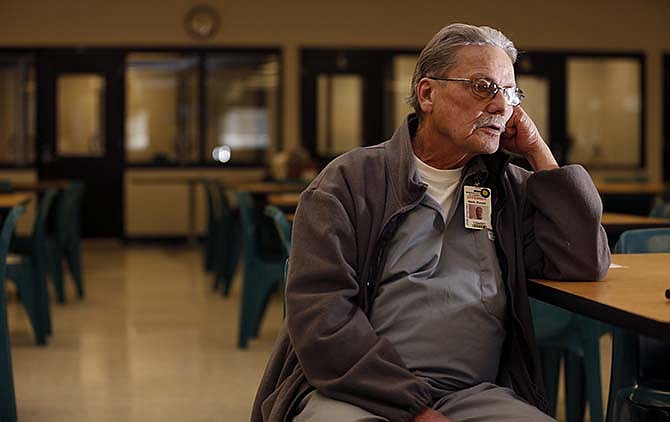BONNE TERRE, Mo. (AP) - A southern Missouri man appealing his conviction in a live-in girlfriend's murder has enlisted some unusual character witnesses: former sheriff's deputies who testified that they planned to arrest another suspect for the crime.
Donald "Doc" Nash, 72, was convicted of murder in 2009 in the 1982 slaying of his girlfriend, Judy Lynn Spencer, and is serving a life prison sentence without the chance for parole. The killing remained unsolved until new DNA evidence linked Nash to Spencer, a 21-year-old Salem hospital receptionist who was strangled with her shoelace and then shot.
The case against Nash, a retired union foreman, relied primarily on minute traces of his DNA that were found beneath Spencer's fingernails. Nash's lawyers argue that this is typical for couples living together. There were no eyewitnesses and was no other physical evidence linking Nash to Spencer's death.
Nash has newfound hope because a St. Louis attorney has taken his case who helped win the release of another Missouri inmate who was serving a life sentence for murder. And he counts among his closest friends one of the former Dent County deputies who investigated Spencer's death and now visits regularly.
"If I thought Doc was guilty, I wouldn't have nothing to do with this," ex-deputy Tim Bell said. "If you ain't got guts enough to stand up for what you believe in, you ain't much account in my opinion."
U.S. Magistrate Judge Terry L. Adelman ruled last year that new DNA evidence from more recent tests - which excludes Nash as the source of genetic material found on the shoe from which the shoelace had been removed - suggests the appeal "deserves further serious consideration." However, he dismissed the petition earlier this month, saying Nash should instead pursue the appeal in state court.
Nash was identified as a suspect immediately after Spencer's death, but ruled out due to the lack of evidence, according to former Dent County prosecutor William "Cam" Seay.
"We didn't have anything to put Doc at the scene, or near the scene, or in contact with her for any time period immediately before" Spencer was killed, said Seay, who later spent 16 years as a Circuit Court judge and four years as a prosecutor in neighboring Crawford County.
Twenty-seven years later, the Missouri Highway Patrol took another look at the case, focusing on the DNA found under Spencer's fingernails and leading then-Dent County prosecutor Jessica Sparks to charge Nash with first-degree murder. Spencer withdrew without explanation weeks after filing the charges, leaving the case in the hands of a special prosecutor.
Two other former deputies say they shortly before Nash was charged, they presented Sparks with a probable cause statement and arrest affidavit naming another suspect in March 2008. That man's fingerprints were one of two sets found on Spencer's abandoned car - neither belonged to Nash. The man, whom the AP is not identifying since he wasn't charged, denied involvement in an interview with Bell.
Another suspect whose fingerprints were found on the car had an extensive, violent criminal history, including a 1988 conviction for sexually assaulting a University of Iowa student and a 2005 domestic abuse arrest. Three witnesses reported seeing that man, who committed suicide in 2008, at a Salem bar with Spencer on the night she died.
The jury in Nash's trial never heard those details, despite Nash's lawyer arguing the fingerprint evidence was relevant because the prosecution said Nash had run his girlfriend's car off the road before abducting her and dumping her body. Missouri law forbids such testimony unless the evidence shows a "direct connection" to the crime.
Instead, the prosecutor detailed how Nash twice argued with Spencer hours before her death and warned "this is the last time you'll see me." Nash, who didn't testify at his trial for strategic reasons, told The Associated Press that when he said that to Spencer, he had been referring to breaking up with her.
Jurors also heard how Nash couldn't account for his whereabouts during the 12-hour window in which investigators believe Spencer was killed. Nash told the AP he was sleeping after fruitlessly driving around looking for her.
Sparks, who now lives in Georgia and no longer practices law, did not respond to several interview requests. Former Highway Patrol Sgt. Henry "Jamie" Folsom, who was in charge of the cold-case investigation, and Ted Bruce, the assistant attorney general who took over the case, also didn't respond to requests for comment.
Nash, who is battling lung disease after spending decades as a miner, insists he didn't kill Spencer.
"There's no way I could kill Judy," he said. "Dent County never saw a reason whatsoever to arrest me. ... Five different prosecutors from the time the murder happened until they arrested me. And I was not a suspect."

